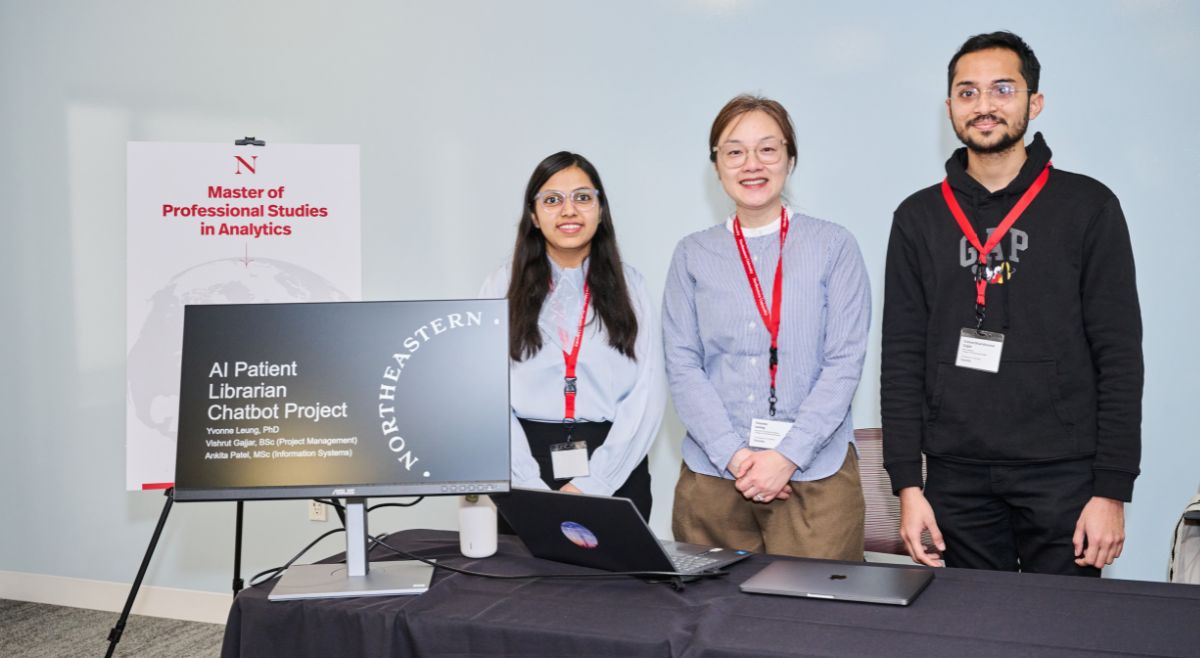Students Play Crucial Role in Bringing Impactful AI Chatbot to Life

Pop-up chat windows on websites, voice commands offering directions, and automated customer service. Interactions with chatbots are increasingly part of our everyday life. Now, a Northeastern University Toronto professor, Yvonne Leung, is using artificial intelligence (AI) technology to develop a chatbot for patients with Metastatic Breast Cancer (MBC). Undertaken in collaboration with the de Souza Institute, part of Canada’s largest health research institute, the University Health Network (UHN), the project is also giving two Northeastern University Toronto students a unique opportunity to contribute their expertise and gain new skills.
Known as the Artificial Intelligence Patient Librarian (AIPL), the chatbot that Yvonne and her team are developing will enable MBC patients to conduct online chat conversations with an AI system. Through these exchanges, patients will learn about their symptoms and treatment options and receive suggestions about resources.
“We want this chatbot to be a program through which patients can receive support,” says Yvonne, who teaches in the Master of Professional Studies in Analytics program. “That doesn’t mean we replace human contact; we just enhance people’s ability for self-care. Given its nature, the project aligns well with the community connection that Northeastern University always advocates for.”
Yvonne and her team are developing AIPL in three phases, to ensure that the app delivers tailored information in a conversational way and directs patients to the most helpful online sources. In Phase 1, Yvonne’s team took a user-centered approach to determine content by working with MBC patients and their families. During Phase 2, they developed the chatbot. Now, with the project set to enter Phase 3 in March, the AIPL team is seeking 50 users to test the chatbot’s ability to deliver patient support.
Ankita Patel and Vishrut Gajjar, graduate students at Northeastern University Toronto, joined the project during the Phase 2 to help with debugging and enhancing the app. “They are phenomenal,” says Yvonne of the students. “It’s my privilege to be able to get them interested and involved. The de Souza Institute team built the chatbot framework, but the system required debugging so Ankita and Vishrut jumped in to help. Their contributions have been vital to the project.”
Ankita, who is pursuing her Master of Science in Information Systems, has a biotechnology background. After feeling inspired by Yvonne during a technology conference last summer, she spoke with the professor, who asked her to join the team. Vishrut, currently pursuing a Master of Science in Project Management at Northeastern, was a student of Yvonne’s who responded to her callout for research assistants. While the students joined the AIPL team in different ways, they had one thing in common: taking initiative to get involved.
“When I met Ankita, I found she was eager to learn and get experience,” says Yvonne. “When she told me she was interested in biomedical technology and that helping patients is her passion, I asked her to be involved right away. Vishrut emailed me immediately after I told his class about the project. He mentioned he was a programmer and had implemented some AI projects before. I really admired his enthusiasm and he was so generous to offer his time, given his considerable study and work commitments.”
Ankita and Vishrut’s respective backgrounds and strengths added to the team’s multidisciplinary approach. For their part, the students say working on the project has enriched their Northeastern University experience.
Ankita’s work has included hard coding the medical script into the software and says:
“Most of my previous experience was in lab work, and I wanted some exposure working on a project that is more technically inclined. This has been the perfect opportunity for me to contribute my understanding of healthcare and technology while gaining confidence and applying what I am learning in the classroom. In my career, I want to build technology for better health care management, so this is where I see myself in the future.”
Vishrut, who started out completing small tasks on the project, ended up working extensively on both the front- and back-ends of the chatbot, including its algorithm. He says, “Working on the project has been very useful for me, in terms of both my tech skills and project management skills. For example, it’s given me an idea of how to speak to multiple stakeholders in a way that supports understanding of complex technologies.”
The AIPL experience has also directly impacted both student’s career paths. For Ankita, who already has her trajectory mapped, working on the project was a confirmation of her career planning. Vishrut, meanwhile, says his involvement cleared up confusion about how best to integrate his existing technology skills with the knowledge he is developing as a Project Management student.
“The project helped me to be sure that the project management skills I am gaining in my program will boost my career,” he says. “I am getting to manage people and collaborate with colleagues from different areas, so I immediately got to see how my technology experience and project management could be combined.”
Once the AIPL is completed, Yvonne says she hopes the technology can be adapted to other types of cancers and diseases. Projects of this kind show that AI can be deployed innovatively and conscientiously to empower patients, improve access to care, and enhance self-care strategies. She also looks forward to involving Northeastern University Toronto students in future UHN projects.
“One of Northeastern University’s goals is to be experiential, and this project is a perfect example of putting that into practice,” says Yvonne. “If we are able to support more projects like this, it will give students practical opportunities to enhance their education and expand their networks while impacting people in need directly.”
Learn more about the Master of Professional Studies in Analytics, Master of Science in Project Management, and Master of Science in Information Systems programs at our weekly program Q&A Drop-in Session.




